-
 Thunder sweep past Grizzlies into NBA playoffs 2nd round, Cavs on brink
Thunder sweep past Grizzlies into NBA playoffs 2nd round, Cavs on brink
-
South Korea's Ryu and Japan's Saigo share LPGA Chevron lead

-
 Canada leaders make closing pitches in campaign upended by Trump
Canada leaders make closing pitches in campaign upended by Trump
-
De Bruyne's Man City exit 'so difficult' for Guardiola

-
 'No regrets' for Amorim over Man Utd move
'No regrets' for Amorim over Man Utd move
-
Lyon and Strasbourg win to close in on Europe, Montpellier relegated from Ligue 1

-
 Toulouse thrash Castres as Top 14 pursuers stumble
Toulouse thrash Castres as Top 14 pursuers stumble
-
Djokovic crashes to nervous Arnaldi in Madrid opener, Swiatek advances

-
 Olympic champs Russell, Davis-Woodhall win at Drake Relays
Olympic champs Russell, Davis-Woodhall win at Drake Relays
-
Browns end Sanders long draft slide

-
 Cavs crush Heat, on brink of NBA playoff sweep
Cavs crush Heat, on brink of NBA playoff sweep
-
Fire rages after major blast at Iran port kills 8, injures hundreds

-
 Kiwi Beamish wins Penn Relays 1,500m crown with late kick
Kiwi Beamish wins Penn Relays 1,500m crown with late kick
-
Mbappe on Real Madrid bench for Clasico Copa del Rey final

-
 England survive France fightback to seal Women's 6 Nations slam
England survive France fightback to seal Women's 6 Nations slam
-
Palace sweep past Villa to reach FA Cup final

-
 CAF appoint Moroccan Lekjaa first vice-president
CAF appoint Moroccan Lekjaa first vice-president
-
Major blast at Iran port kills 5, injures hundreds

-
 Rodgers vows to stay with Celtic after fourth successive Scottish title
Rodgers vows to stay with Celtic after fourth successive Scottish title
-
Ipswich relegated as Newcastle, Chelsea boost top five bids

-
 Canada leaders make final pitches in campaign upended by Trump
Canada leaders make final pitches in campaign upended by Trump
-
Mullins -- Ireland's national training treasure

-
 US, Iran say progress in 'positive' nuclear talks
US, Iran say progress in 'positive' nuclear talks
-
Mullins emulates O'Brien with second successive trainer's title
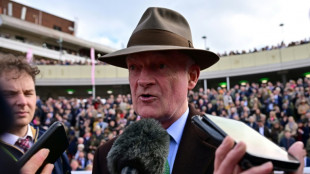
-
 Ipswich relegated after one season in Premier League
Ipswich relegated after one season in Premier League
-
Just Stop Oil activist group holds final march
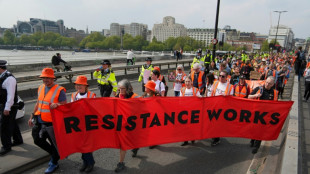
-
 Djokovic crashes to nervous Arnaldi in Madrid opener
Djokovic crashes to nervous Arnaldi in Madrid opener
-
Syria's Kurds demand 'democratic decentralised' Syria
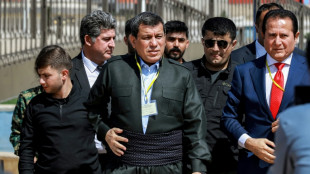
-
 Leverkusen win to delay Bayern and Kane's title party
Leverkusen win to delay Bayern and Kane's title party
-
Buenos Aires farewells native pontiff with tears and calls to action
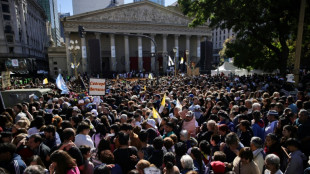
-
 Turkey's opposition says Erdogan's canal plan behind latest arrests
Turkey's opposition says Erdogan's canal plan behind latest arrests
-
Maresca hails 'nasty' Chelsea as top five bid stays alive

-
 Trump raises Putin doubts after Zelensky talks at pope's funeral
Trump raises Putin doubts after Zelensky talks at pope's funeral
-
Major blast at Iran port kills 4, injures hundreds

-
 Napoleon's sword to be sold at auction in Paris
Napoleon's sword to be sold at auction in Paris
-
Iran, US discuss nuclear deal in third round of talks

-
 Buenos Aires farewells native pontiff with call to action
Buenos Aires farewells native pontiff with call to action
-
Warholm sets hurdles world record at Diamond League, Holloway shocked

-
 US students 'race' sperm in reproductive health stunt
US students 'race' sperm in reproductive health stunt
-
Wikileaks founder Assange joins crowds for pope funeral

-
 Leader Marc Marquez claims Spanish MotoGP sprint victory
Leader Marc Marquez claims Spanish MotoGP sprint victory
-
Celtic win fourth successive Scottish Premiership title

-
 Jackson ends drought as Chelsea boost top five push
Jackson ends drought as Chelsea boost top five push
-
Warholm sets 300m hurdles world record in Diamond League opener

-
 Major blast at south Iran port kills 4, injures hundreds
Major blast at south Iran port kills 4, injures hundreds
-
Russia says retook Kursk from Ukraine with North Korean help

-
 Francis laid to rest as 400,000 mourn pope 'with an open heart'
Francis laid to rest as 400,000 mourn pope 'with an open heart'
-
Trump, Zelensky meet on sidelines of pope's funeral

-
 'Shared loss': Filipino Catholics bid Pope Francis farewell
'Shared loss': Filipino Catholics bid Pope Francis farewell
-
Families unable to reunite as India-Pakistan border slams shut
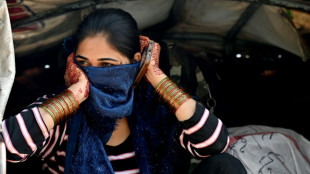
Truth: The end of the ‘Roman Empire’
The fall of the Roman Empire in the fifth century AD has long captivated historians and the public alike. For centuries, scholars have debated the precise causes of the Empire’s decline, offering myriad explanations—ranging from political corruption and economic instability to moral degeneration and barbarian invasions. Yet despite the passage of time and the wealth of research available, there remains no single, universally accepted answer to the question: why did the Roman Empire truly collapse?
A central factor often cited is political fragmentation. As the Empire grew too vast to govern effectively from one centre, Emperor Diocletian introduced the Tetrarchy—a system dividing the realm into eastern and western halves. While initially intended to provide administrative efficiency, this division ultimately paved the way for competing centres of power and weakened the unity that had long defined Roman rule. Frequent changes of leadership and civil wars further sapped the state’s coherence, undermining confidence in the imperial regime.
Economics played an equally crucial role. Burdened by expensive military campaigns to protect ever-extending frontiers, the Empire resorted to debasing its currency, provoking rampant inflation and eroding public trust. The resulting fiscal strains fuelled social unrest, as high taxes weighed heavily upon small farmers and urban dwellers alike. Coupled with declining trade routes and resource depletion, these pressures contributed to a persistent sense of crisis.
Compounding these challenges was the growing threat from beyond Rome’s borders. Germanic tribes such as the Visigoths, Vandals, and Ostrogoths gradually eroded the Western Empire’s defensive capabilities. While earlier Roman armies proved formidable, internal discord had dulled their edge, allowing external forces to breach once-impenetrable frontiers.
Modern historians emphasise that the Empire did not fall solely because of barbarian invasions, moral decay, or fiscal collapse; instead, its downfall was the outcome of a confluence of factors, each interacting with the other. The story of Rome’s fall thus serves as a stark reminder that even the mightiest of civilisations can succumb to the inexorable weight of political, economic, and social upheaval.

China Strikes Back: Tariff War

Spain: China's Gateway to Europe

Europe's Economic Self-Sabotage

Trump fails due to Russia's tough stance

Pope Francis: A Transformative Legacy

Portugal: Living Costs Soar

Is Australia’s Economy Doomed?

DOGE Fails to Slash U.S. Spending

Slovenia’s Economic Triumph

Next Generation EU a scam?

Can Poland Rescue Europe?



